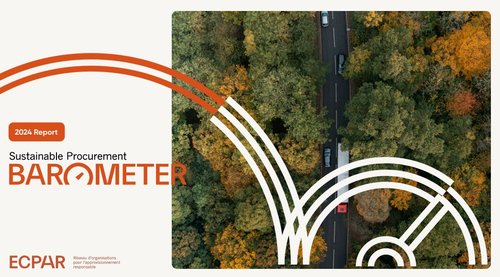

2024 Report
Cliquez ici pour accéder à la version française de cette page

A SNAPSHOT OF SUSTAINABLE PROCUREMENT MATURITY PRACTICES IN CANADA
The 2024 Sustainable Procurement Barometer Reports present the results of the data collected between October and December 2024.
This 4th edition of the Sustainable Procurement Barometer Report, along with sector-specific reports, is published in collaboration with Université Laval, University of Ottawa, and ITHQ.
From October to December 2024, Quebec and Canadian organizations of every size and from all sectors responded to the 2024 Barometer survey. Their participation enabled the collection of exclusive data and an updated portrait of sustainable procurement practices in Canada.
The 2024 Sustainable Procurement Barometer Report is now available. For the first time, it will be followed in the Fall by sector-specific reports dedicated to public institutions, small and medium-sized organizations (SMOs), and the food sector.
Click here to rewatch the launch webinar for the 2024 Sustainable Procurement Report

2024 Sustainable Procurement Barometer Reports
Click on the links below to get access to our available reports:
- Sustainable Procurement Barometer Report 2024
- Sustainable Procurement Barometer Report 2024 – Overview
- Public institutions report**
- SMOs report**
- Food sector report**
** These reports will be available in Winter 2026.
Consult the last reports:
The 2024 Barometer Questionnaire is still open and available!
Right now, you can assess your supply chain using the 2024 Sustainable Procurement Barometer. By participating in the online questionnaire, you will receive a Result Sheet that highlights your level of maturity and areas for improvement. To go further, receive personalized support from ECPAR’s advisors.
Your individual result sheet will give you an overall evaluation of your sustainable procurement practices and allow you to compare yourself to the average of other organisations. This evaluation offers a unique perspective to identify challenges and means for many strategic and operational aspects. Click here to learn more.
You have any questions, please contact us at info@ecpar.org.
Innovative Methodology
The Barometer methodology is developed in partnership with prestigious institutions such as the Université Laval’s Laboratoire interdisciplinaire de la responsabilité sociale des entreprises (LIRSE), the University of Ottawa, the Institut de tourisme et d'hôtellerie du Québec (ITHQ), the International Reference Center for Life Cycle Assessment and Sustainable Transition (CIRAIG) and the Social Sciences and Humanities Research Council (SSHRC).
This partnership allows us to rely on the latest scientific knowledge and best practices in Canada and at an international level and follow recognized standards, including ISO 20400, and guidelines.
Our outreach partners for the 2024 Barometer
Membres de l’ECPAR • Fédération des chambres de commerce du Québec • Buy Social Canada • Canadian Collaboration for Sustainable Procurement • Écocert • Ellio • Agéco • Union des municipalités du Québec • Services publics et Approvisionnement Canada • Université Laval • RECYC-QUÉBEC • CIRAIG • ITHQ • Réseau des femmes en environnement • Ville de Gatineau • Maillon Vert • Nixa





